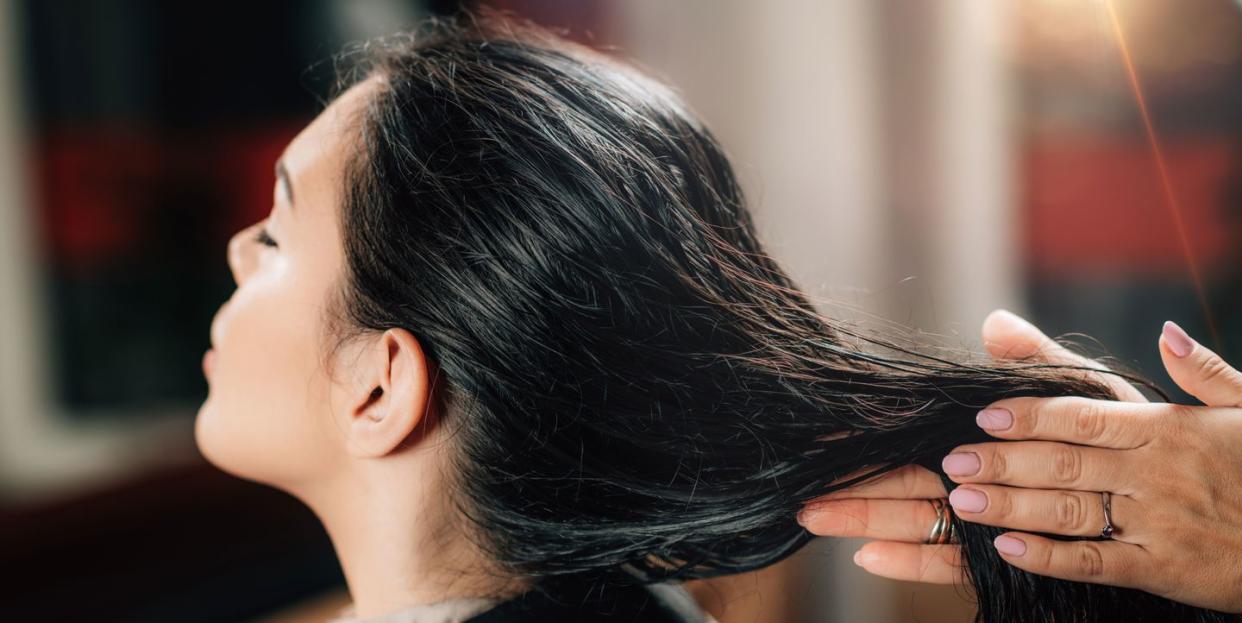The Expert Guide to Using Jojoba Oil in Your Hair

Name a naturally-derived oil, and we've probably tried using it on our hair—to mixed results. Jojoba oil, though, has stood the test of time, winning over pros, at-home stylists, and beauty editors everywhere. More than just an industry trend, the silky smooth oil produced by the Simmondsia chinensis plant serves as one of the best styling products on the planet thanks to its ability to enhance and protect moisture.
"Jojoba oil is one of nature’s finest creations," says Michelle Sultan, a hairstylist and the brand ambassador and creative director for Imbue Curls. "In its original state it is more of a wax-like substance that is extracted from the seeds of the jojoba bush, which is normally found in North American desert regions."
So, no surprise that a desert botanical knows its way around retaining moisture. Ahead, why jojoba oil is one of the best—and simplest—hair care products out there, plus how to use it and which type of jojoba oil to buy.
Jojoba Oil's Hair Benefits
On the surface—no pun intended—it's easy to get why jojoba oil is a fan favorite for hair. It's an oil, and putting oil on your hair makes it feel good and look glossy. However, there's more to the ingredient than just that.
Sultan notes how jojoba oil actually preserves and seals in hair shaft moisture. "The benefits of using jojoba oil are immense, especially if you suffer with hair that is prone to dryness," she continues. "Also, if you suffer from an irritated scalp, the oil can help to alleviate dry and itchy scalp, with it being non-comedogenic (doesn’t block pores)." This means that you'll be able to naturally lock in hair and scalp hydration without worrying if the product will make you break out. Win-win.
How To Use Jojoba Oil On Hair
Quick note: Even if jojoba oil is skin-friendly and moisture-assisting, it might not be perfect for your hair type. Fine, straight hair—the type often weighed down by thicker products—might not play well with any oil, even jojoba. Sultan says she would "definitely avoid" using jojoba oil on type 1 hair, aka 1a through 1c hair with either no wave or very little wave.
"With that said, curly hair types—which tend to have less natural sebum—would benefit greatly from jojoba oil," she says. Knowing and understanding your hair type and texture will also reveal which oil to purchase. "For instance, if your hair type is with a very tight coil and high density, I would consider using the cold-pressed version," Sultan explains, referring to a method often credited for allowing oils to retain higher nutritional value. (Or hair value, as it is.)
Going with an oil versus another product, such as one with jojoba included in the formula, also gives you full reign of how you use it. "As a hairstylist, I like to know exactly how jojoba is going into the hair, so I personally prefer just a lightweight liquid form of the oil. I believe there are many benefits of the oils being used in different ways; different hair requires different levels of moisture and sealants," Sultan explains. "I would use jojoba oil after applying a moisturizer to seal the cuticle shaft and stop moisture loss on maybe braids, for instance."
How Often Should You Use Jojoba Oil on Hair?
Recap time. Jojoba oil isn't a moisturizer itself; it seals in moisture. Factor that in when you're deciding how often to lather your hair up in the oil—it probably needs much less than you'd think at first. According to Sultan, jojoba oil usage depends on how often you wash your hair. "Once the oil is applied after moisturizing, jojoba oil should stay present on the hair until it is cleansed again," she says.
Imagine jojoba as the very last step of a wash day routine if you have curly or coily hair: "After cleansing, conditioning, moisturizing, and styling, you would use a small amount warmed through hands and apply [it] directly onto hair," the hairstylist explains. "This will also help to reduce frizz and make hair feel softer." Then rinse and repeat.
You Might Also Like

